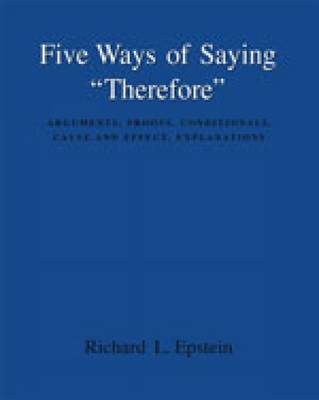Logic is the art of making inferences, of how to say "therefore". In this book, Richard L. Epstein surveys the five main ways to do that: arguments, proofs, conditionals, cause and effect, and explanations. He does so in an exceptionally clear and simple way, unifying the most advanced research in a presentation that is suitable for students, scholars, and instructors. Part I covers arguments, the use of inferences to convince someone that a conclusion is true. In trying to decide whether there are clear standards for saying that an argument is good or bad, a basis for analyzing inferences is given that carries over to other uses of "therefore." Part II is concerned with how the use of inferences differs when the conclusion is a necessary claim, as in mathematics. Part III examines claims of the form "if ...then ..." and attempts to resolve what is meant by saying that some conditionals are condensed inferences. Part IV discusses cause and effect. It is often said that the relation of cause to effect is a necessary one. Epstein suggests that we can understand that relation as one of inference from a claim describing the cause to a claim describing the effect.
Some assertions of cause and effect are explanations, which suggests that at least some explanations can be understood as a kind of inference. Which explanations fit into that pattern and what standards can be used to evaluate them are the topics of Part V.
- ISBN10 0534580661
- ISBN13 9780534580667
- Publish Date 1 June 2001
- Publish Status Active
- Out of Print 11 April 2012
- Publish Country US
- Publisher Cengage Learning, Inc
- Imprint Wadsworth Publishing Co Inc
- Edition 2nd Revised edition
- Format Paperback
- Pages 380
- Language English
